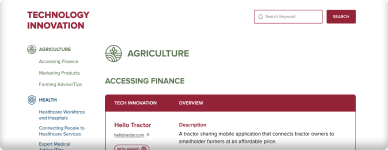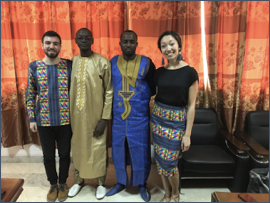During January Michelle Korte and her classmate Oriol Solé Borràs, traveled to the Gambia to research the social determinants adversely affecting maternal mortality in this small West African nation. This was her first experience in Gambia; she had worked previously in East Africa and Myanmar, and was excited to learn more about this new country. “What really struck me with my time doing in-country research was the huge gulf between knowing at a factual level about statistics like maternal or newborn mortality and hearing people’s individual stories about facing these phenomena in the context of their real lives,” noted Michelle.
Michelle was one of 83 student researchers who signed on for the Harvard Ministerial Student Policy Research Program, which provides policy research support to Ministers participating in the Harvard Ministerial Leadership Program. The Program offers an opportunity for Harvard graduate students to gain applied research experience working directly with government ministries on research questions that can inform their work tackling key human development challenges in developing countries. Michelle was a first-year MPH student at the Harvard T.H. Chan School of Public Health. “It was the demand-driven nature of these projects, with country authorship and stakeholders’ explicit desire and positioning to enact change based on the findings, that really attracted me to working on this project,” Michelle said.
Reflecting on her time working in Gambia, Michelle says working side-by-side with Health Ministry officials and service providers was a completely different experience compared with the initial desk-research she conducted with the team leading up to the trip. Once in-county, “conversations infused humanity into the statistics and really implored us to bring our best to the project – not just summarizing what we heard, since these problems are by no means new to our Ministry counterparts, but putting forth an analysis that may be useful and actionable.”
Michelle admits that some of the discussions with patients and health workers were at times difficult to hear, especially when speaking with someone who had lost a loved one. Discussing societal determinants of poor maternal health (such as poverty and patriarchy), ways in which women are not afforded decision making power on matters regarding their own health and body, as well as the prevalence of female genital mutilation (which is prohibited in Gambia but has proven difficult to enforce) were also at times hard to take. However, that was balanced out by positive progress in tackling some of these issues and stories from people interviewed. “I loved hearing how impassioned the frontline health workers were about saving women’s lives and generally about serving their communities,” Michelle said, “…or when a nurse would walk us through their facility, point out the data systems and the different clinics and services available, or share with me stories about the donations they received to build new operating wards and their speculation about how far those donations would go in improving the health of their communities. This was really wonderful to experience.”
What struck her most were some of the many homegrown solutions to the numerous challenges around poor maternal health. One being devising male-targeted offerings, such as male-centered antenatal classes to educate fathers about reproductive health and to encourage greater engagement by husbands in their wives’ pregnancy. “These solutions seem simple but powerful, as health workers told us they are already improving men’s engagement, as well as women’s outcomes.” said Michelle, adding, “These examples provide hope in the face of great challenges, and I’m excited to see how the Gambia continues to produce and scale such innovative approaches, and how Harvard and others may continue to support that.”
More info on other areas of work that Michelle Korte has done can be found here: https://www.hsph.harvard.edu/news/features/finding-peace-and-purpose-during-a-pandemic/


